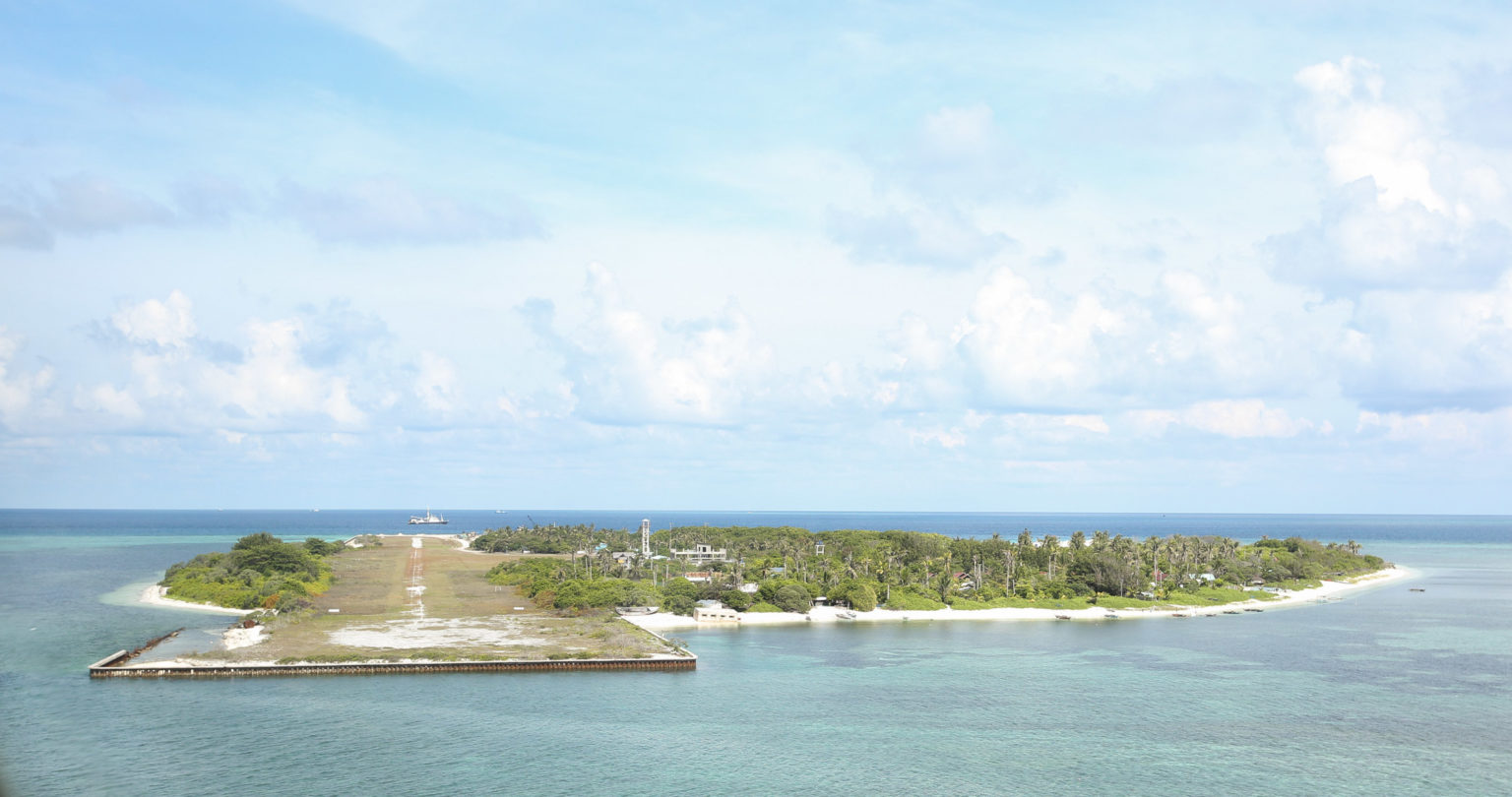
Aerial view of Pag-asa Island, Kalayaan Group of Islands, Palawan as seen from the cockpit of a PAF C-130T. INQUIRER FILE PHOTO/LYN RILLON
The Philippine Coast Guard (PCG) has set up command-observation posts (COPs) on three islands in the Kalayaan Island Group in Palawan province, which are expected to improve its maritime domain awareness in the West Philippine Sea (WPS).
The COPs were established on Likas (West York), Lawak (Nanshan) and Parola (Northeast Cay) Islands on May 17, the PCG said in a statement on Friday. The three are among the nine features occupied by the Philippines in the disputed Spratly Islands.
The PCG’s Task Force Kaligtasan sa Karagatan built smart houses and installed radio communications systems on the islands as part of the COPs.
“Through these COPs, we improve our capabilities in promoting maritime safety, maritime search and rescue, and marine environmental protection,” said the PCG commandant, Adm. Artemio Abu.
“These COPs will optimize the strategic deployment of PCG assets by monitoring the movement of merchant ships in the surrounding waters and communicating maritime incidents to the PCG national headquarters,” Abu added.
Pag-asa island
Secretary Hermogenes Esperon, National Security Council adviser and chair of the National Task Force for the West Philippine Sea, expressed support for the PCG’s initiative.
In a visit to Pag-asa (Thitu) Island on May 14, Abu said he saw five PCG ships anchored in the vicinity. A number of Filipino fishing boats. Vietnamese and Chinese vessels, and Chinese Coast Guard vessels were also in the area, specifically in the waters off Zamora (Subi) Reef.
“My guidance to the PCG personnel was that we should be the one challenging the presence of foreign vessels. But according to the Coast Guard Fleet, the WPS was peaceful and the vessels of Vietnam and China respected our ongoing mission there,” he said.
Pag-asa is the second-largest naturally occurring feature in the Spratlys next to the Taiwan-occupied Itu Aba, and the only one with civilian inhabitants. The Philippines has occupied it since 1971.
The island is the town proper of the Kalayaan municipality in Palawan, and has an airfield and a naval base. The Philippines has occupied five other features in the Spratlys since the 1970s: Rizal (Commodore) Reef; Patag (Flat) Island; Panata Island (Melchora Aquino Cay/Loaita Cay); Kota (Loaita) Island; and Ayungin (Second Thomas) Shoal.
5 buoys
On Wednesday, the PCG installed five 9.1-meter (30-foot-long) navigational buoys carrying the Philippine flag off the four “critical” islands of Lawak, Likas, Parola and Pag-asa.
According to Abu, the buoys communicate that the waters are special protected zones in which mining and oil exploration are banned.
The buoys are among the 10 floating markers that arrived in Cebu on May 7 from Valencia, Spain. They are equipped with modern marine aids as well as a remote monitoring system that uses satellite technology to transmit data to the PCG national headquarters in Port Area, Manila.
The PCG said more navigational buoys would be installed within the country’s exclusive economic zone (EEZ). The Commission on Human Rights, through its executive director Jacqueline de Guia, on Friday praised the PCG for installing the buoys and “for asserting the sovereignty of the Philippines over the disputed territories where China has constructed artificial islands and interfered with Filipino fishing activities.”
Invoking its so-called nine-dash line, China claims almost the entire South China Sea, including the WPS. The Philippines, Brunei, Vietnam, Taiwan and Malaysia have overlapping claims on the waters.
The Permanent Court of Arbitration invalidated China’s sweeping claim in a 2016 ruling.
But China rejects the ruling and continues to claim and occupy features in the South China Sea. It also controls Panatag (Scarborough) Shoal, which is part of Masinloc, Zambales, and is within the Philippines’ 370-kilometer EEZ.
READ: State-of-the-art buoys to assert Benham Rise belongs to PH